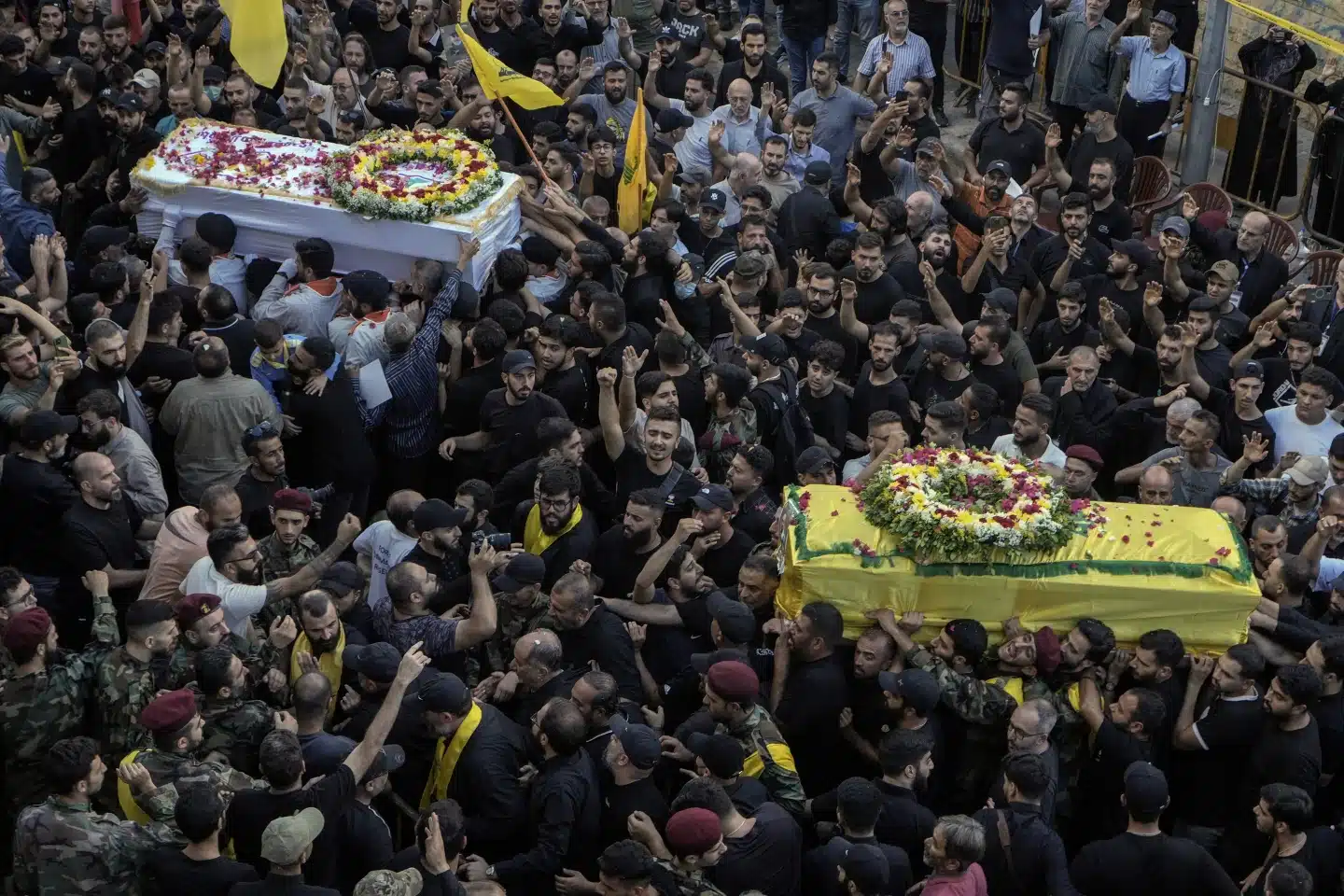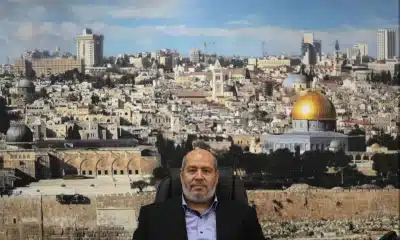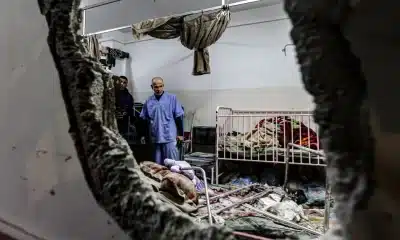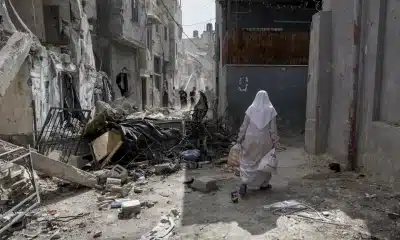News
Hezbollah Leader Vows Retaliation Against Israel For Attacks On Devices As Both Sides Trade Strikes

BEIRUT — Hezbollah’s leader pledged Thursday to continue daily attacks on Israel despite this week’s tragic sabotage of its fighters’ communication equipment, and claimed Israelis displaced from homes near the Lebanon border due to fighting would be unable to return until the conflict in Gaza ended.
Hezbollah and Israel conducted more attacks across the border, with Hassan Nasrallah speaking for the first time since the mass bombing of devices in Lebanon and Syria, which he called a “severe blow” and threatened to retaliate for.
The two days of strikes on thousands of Hezbollah pagers and walkie-talkies have been largely blamed on Israel, raising concerns that 11 months of near-daily exchanges of fire between Hezbollah and Israel will develop into an all-out war. Israel has not confirmed or denied involvement in the assaults.
AP Image
Hezbollah Leader Vows Retaliation Against Israel For Attacks On Devices As Both Sides Trade Strikes
During Nasrallah’s address, Hezbollah hit at least four times in northern Israel, killing two Israeli troops earlier that day. Israeli warplanes swooped low over Beirut as Nasrallah spoke, breaking the sound barrier and scattering birds, leading residents in houses and offices to rapidly open windows to avoid breaking them.
Israel also launched attacks in southern Lebanon on Thursday, claiming to have hit dozens of missile sites and other Hezbollah infrastructure, though it was unclear whether any casualties had occurred.
In recent weeks, Israeli commanders have increased their warnings about a wider military campaign against Hezbollah, stating that they are committed to putting an end to the group’s fire so that tens of thousands of Israelis can return to their homes near the border.
In a Thursday briefing, Israel’s defense minister stated that Hezbollah will “pay an increasing price” as Israel works to make conditions near its border with Lebanon secure enough for civilians to return.
“The sequence of our military actions will continue,” he informed us.
The attack on electronic equipment appeared to be the conclusion of Israel’s months-long campaign to target as many Hezbollah militants as possible at once, but civilians were also killed. The bombings on Tuesday and Wednesday killed at least 37 people, including two children, and injured approximately 3,000.
Nasrallah stated that the group is researching how the bombings were carried out.
“Yes, we were subjected to a huge and severe blow,” he informed me. “The enemy crossed all boundaries and red lines,” he told me. He accused Israel of attempting to kill thousands of people at once, citing the large number of pagers and walkie-talkies. “The enemy will face a severe and fair punishment from where they expect and don’t expect.”
He stated that Hezbollah will continue to launch rockets into northern Israel as long as the war in Gaza continues and that Israel will be unable to return its citizens to the border region. “The only way is stop the aggression on the people of Gaza and the West Bank,” he argued. “Neither strikes, nor assassinations nor an all-out war will achieve that.”
Earlier Thursday, Hezbollah claimed to have hit three Israeli military positions near the border, two of which were equipped with drones. According to Israeli hospitals, eight persons were lightly or moderately hurt.
Hezbollah claims its near-daily fire is a demonstration of support for Hamas. Israel’s 11-month conflict with Hamas in Gaza began on October 7, when its fighters led an attack on Israel.
Israel has retaliated to Hezbollah bombings in southern Lebanon by striking prominent members of the group in the capital, Beirut. The exchanges killed hundreds in Lebanon and dozens in Israel, forcing tens of thousands of people to flee on both sides of the border.
Under intense pressure from the US, France, and other countries, Israel and Hezbollah have repeatedly backed away from a full-fledged conflict.
Gallant told Israeli forces on Wednesday, “We are at the start of a new phase in the war—it requires courage, determination, and perseverance.” He made no mention of the exploding bombs, instead praising Israel’s army and security agencies, stating, “The results are very impressive.”
He claimed that after months of fighting Hamas in Gaza, “the centre of gravity is shifting to the north by diverting resources and forces.”
Israel began sending extra troops to its border with Lebanon on Wednesday as a precautionary measure, according to Israeli officials. Lt. Gen. Herzi Halevi, Israel’s army chief, said plans for more action against Hezbollah have been draughted out, but media reports suggest the government has yet to decide whether to start a major offensive in Lebanon.
Lebanon is still reeling from the devastating device attacks on Tuesday and Wednesday.
AP News Image
Hezbollah Leader Vows Retaliation Against Israel For Attacks On Devices As Both Sides Trade Strikes
The explosions have alarmed the Lebanese who fear a full-scale war. The Lebanese Army said it has begun identifying and detonating suspicious pagers and communication devices, while the country’s civil aviation authorities have banned pagers and walkie-talkies from all planes departing Beirut’s international airport till further notice.
The attack was expected to seriously disrupt Hezbollah’s internal communication as members scrambled to find safe ways to communicate with one another. Hezbollah announced the deaths of five combatants on Thursday but did not clarify whether they were killed in blasts or on the front lines.
The blasts went off wherever pagers or walkie-talkies were found in Beirut, eastern and southern Lebanon — in homes and cars, grocery stores and cafes, and on the street, even at a funeral for some of those killed in the bombings, often with family and other bystanders nearby.
Many people sustained gaping wounds on their legs, abdomens, and faces, or were mutilated in the hand. The pager blasts on Tuesday killed 12 people, including two children, and injured an estimated 2,300 more. The following day’s explosion killed 25 people and injured over 600, according to Health Minister Firas Abiad’s latest estimates.
Abiad told reporters that the injuries on Wednesday were more severe than the day before because the exploding walkie-talkies were larger than the pagers. He commended Lebanon’s hospitals, saying they had dealt with the influx of wounded in just hours. “The onslaught was indiscriminate. It was a war crime,” he stated.
SOURCE | AP









































